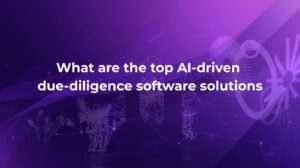
Best Sources for Private Company Valuation Multiples by Industry
The best sources for private company valuation multiples by industry, how investors use them, and key limitations in private market analysis.

What once felt like science fiction is now business-critical. Voice AI has gone from a clever novelty to an essential driver of efficiency, growth, and innovation across the global economy. In 2025, it’s no longer just “nice to have”, it’s redefining how we sell, support, operate, and invest. Whether it’s an AI voice agent closing deals at scale or transforming customer service overnight, Voice AI isn’t just reshaping workflows, it’s reshaping what’s possible. And we’re only at the beginning.
Voice AI is redefining customer service by deploying intelligent voice agents capable of handling inquiries around the clock. These agents, powered by advanced language models, can understand and respond to customer needs without human intervention. Companies have reported significant efficiency gains; for instance, some have seen a 4× increase in operational efficiency by automating nearly half of their customer calls. McKinsey & Company
In sales, voice AI enables automated outreach, allowing businesses to conduct personalized sales calls at scale. Startups like Solda.AI have demonstrated the potential of AI-driven sales agents, reporting $7 million in incremental revenue in a single year. These agents can engage in human-like conversations, increasing trust and conversion rates.
Private equity and venture capital firms are leveraging voice AI for deal sourcing and due diligence. AI agents can conduct preliminary outreach to potential investment targets, significantly accelerating the sourcing process. Additionally, voice AI can transcribe and analyze meetings, highlighting key insights and risks, thereby enhancing decision-making efficiency.
In regulated industries, voice AI plays a crucial role in compliance by monitoring communications in real-time. It can detect deviations from approved scripts and flag potential regulatory breaches, reducing the risk of non-compliance. Moreover, AI-generated transcripts provide a reliable audit trail, facilitating easier retrieval and review of past communications.
Voice AI simplifies data collection by enabling conversational surveys and interviews. Organizations can gather qualitative and quantitative data through spoken interactions, improving response rates and data richness. This approach is particularly beneficial in field operations, where hands-free data entry enhances efficiency and accuracy.
In environments where manual data entry is impractical, such as warehouses and fieldwork, voice AI allows workers to interact with systems hands-free. For example, warehouse employees can receive picking instructions via voice and confirm tasks verbally, increasing productivity and reducing errors.
Voice AI’s multilingual capabilities enable businesses to communicate with a global customer base effectively. AI agents can seamlessly switch between languages, providing consistent and personalized service across different regions. This capability not only enhances customer experience but also allows companies to expand into new markets without significant additional resources.
Voice AI assists in meetings by transcribing discussions, summarizing key points, and identifying action items. This automation reduces the administrative burden on employees, allowing them to focus on strategic tasks. Some organizations have reported saving up to 20 minutes per meeting, translating to significant productivity gains over time.
Executives can utilize voice AI assistants to manage schedules, draft communications, and retrieve reports through simple voice commands. This support streamlines administrative tasks, enabling leaders to allocate more time to strategic decision-making and leadership responsibilities.
Software-as-a-Service (SaaS) providers are integrating voice AI into their platforms, offering users a more intuitive and efficient interface. For instance, legal and financial software now includes voice-activated features, allowing professionals to perform complex tasks through simple voice commands, thereby enhancing user experience and productivity.
In closing, Voice AI is not just transforming the economy, it’s igniting a wave of high-growth opportunities that savvy investors can’t afford to ignore. With the global voice AI market surging 25% year-over-year startupsmagazine.co.uk, this revolution is unleashing new markets and reimagining entire industries at an unprecedented pace. For private equity and venture capital leaders, now is the time to harness these opportunities and help shape the voice-driven future. If you’re looking to discover and track the most promising AI-driven startups riding this wave, turn to DealPotential, the platform offering the insights and intelligence you need to find tomorrow’s Voice AI leaders and secure your stake in this booming sector.
Note: The information presented in this blog post is based on industry analyses and reports available as of 2025.
Book a free demo with DealPotential and get real-time insights on the next billion-dollar opportunities.
SHARE:

The best sources for private company valuation multiples by industry, how investors use them, and key limitations in private market analysis.

AI-driven due diligence software helps M&A teams assess companies earlier. DealPotential supports early-stage commercial due diligence.

Predict future M&A deals using early indicators and AI signals. Learn how DealPotential identifies acquisition-ready companies earlier.
We use cookies to improve your experience, analyze web traffic, deliver customized content, and support marketing efforts.
DealPotential Investment Intelligence Platform Proposal Agreement
WHEREAS, the Seller agrees to provide access to the DealPotential Investment Intelligence Platform,
WHEREAS, the Client agrees to purchase the DealPotential Investment Intelligence Platform according to the terms and conditions laid out in this contract.
THEREFORE, in consideration of the mutual agreement made by the parties hereto, the Seller and the Purchaser (individually, each a “Party” and collectively, the “Parties”) agree to the following:
2. Subscription: By subscribing to the Platform, you agree to pay the monthly or yearly subscription fee, as specified in your subscription plan.
3. Payment: Payment is due monthly in advance and processed via Stripe. The subscription renews automatically until cancelled.
4. Cancellation: You may cancel your subscription at any time, and it will take effect at the end of the current billing cycle. No refunds will be provided for partial months.
5. Data Privacy: We are committed to safeguarding your data. Please refer to our Privacy Policy for details on data handling and protection.
6. Intellectual Property: All content, data, and reports provided by the Platform are protected by intellectual property laws and are for your internal use only.
7. Termination: We reserve the right to terminate your access to the Platform for any violation of these terms or for any reason at our discretion.
8. Governing Law: These terms are governed by the laws of Sweden, and any disputes shall be subject to the exclusive jurisdiction of the courts in Sweden.
10. Disclaimer: We disclaim all responsibility for any decisions made by users based on the data provided in our platform. All investment decisions are solely the responsibility of the user. We are not involved in any user decisions and only provide data and assessments for informational purposes.